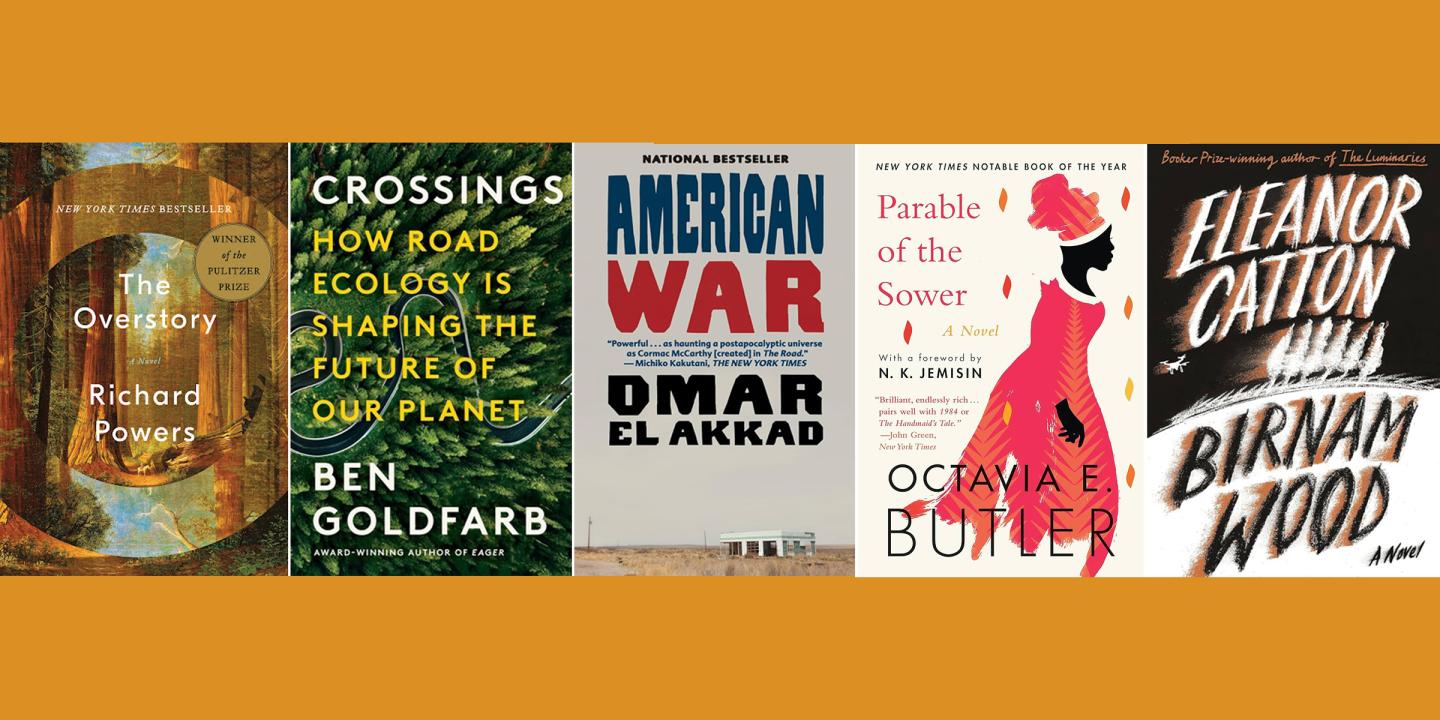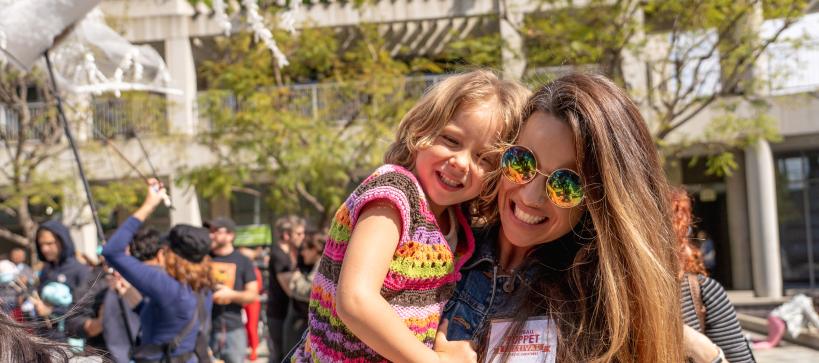
These lively discussion groups are quick to sell out for a reason! Through compelling and thought-provoking narratives, the novels this semester invite our students to explore pressing issues of climate change through multiple lenses.
This is a past program
This program took place on
September 2024–January 2025
About the Class
One has only to turn on the television or read current headlines to learn about the most recent wildfires, hurricanes, or droughts. In response to these pressing issues of climate change, environmental justice, and environmental racism, the genres of climate fiction, literature explicitly focused on climate change, and eco-fiction, have emerged. Through compelling and thought provoking narratives, the novels this semester invite our students to explore these issues through multiple lenses.
SEPTEMBER: The Overstory by Richard Powers (2019)
The Overstory, winner of the 2019 Pulitzer Prize in Fiction, is a sweeping, impassioned work of activism and resistance that is also a stunning evocation of―and paean to―the natural world. From the roots to the crown and back to the seeds, Richard Powers’ twelfth novel unfolds in concentric rings of interlocking fables that range from antebellum New York to the late twentieth-century Timber Wars of the Pacific Northwest and beyond. There is a world alongside ours―vast, slow, interconnected, resourceful, magnificently inventive, and almost invisible to us. This is the story of a handful of people who learn how to see that world and who are drawn up into its unfolding catastrophe.
OCTOBER: Crossings by Ben Goldfarb (2023)
Shortlisted for the NYPL's 2024 Helen Bernstein Book Award for Excellence in Journalism and a New York Times Notable Book of 2023, Ben Goldfarb’s text is an eye-opening account of the global ecological transformations wrought by roads.
Some 40 million miles of roadways encircle the earth, yet we tend to regard them only as infrastructure for human convenience. While roads are so ubiquitous they’re practically invisible to us, wild animals experience them as entirely alien forces of death and disruption. In Crossings, environmental journalist Ben Goldfarb travels throughout the United States and around the world to investigate how roads have transformed our planet. A million animals are killed by cars each day in the U.S. alone, but as the new science of road ecology shows, the harms of highways extend far beyond roadkill. Creatures from antelope to salmon are losing their ability to migrate in search of food and mates; invasive plants hitch rides in tire treads; road salt contaminates lakes and rivers; and the very noise of traffic chases songbirds from vast swaths of habitat. Yet, road ecologists are also seeking to blunt the destruction through innovative solutions.
NOVEMBER: American War by Omar el Akkad (2017)
An audacious and powerful debut novel by Omar el Akkad: a second American Civil War, a devastating plague, and one family caught deep in the middle—a story that asks what might happen if America were to turn its most devastating policies and deadly weapons upon itself.
In a disturbingly believable near future, the need for sustainable energy has torn the United States apart. The South wants to maintain the use of fossil fuels, even though the government in The North has outlawed them. Now, unmanned drones patrol the skies, and future martyrs walk the markets. For the first time in three hundred years, America is caught up in a civil war. Out of this turmoil comes Sarat Chestnut, a southern girl born into the ongoing conflict. At a displaced persons camp, a mysterious older man takes her under his wing, and while her family tries to survive, Sarat is made into a deadly instrument of war, with consequences for the entire nation.
DECEMBER: Parable of the Sower by Octavia Butler (1993)
Octavia Butler was a renowned writer who received a MacArthur "Genius" Grant and PEN West Lifetime Achievement Award for her body of work. She was the author of several award-winning novels including Parable of the Sower, which was a New York Times Notable Book of the Year, and was acclaimed for her lean prose, strong protagonists, and social observations in stories that range from the distant past to the far future. She passed away on February 24, 2006.
When global climate change and economic crises lead to social chaos in the early 2020s, California becomes full of dangers, from pervasive water shortage to masses of vagabonds who will do anything to live to see another day. Fifteen-year-old Lauren Olamina lives inside a gated community with her preacher father, family, and neighbors, sheltered from the surrounding anarchy. In a society where any vulnerability is a risk, she suffers from hyper-empathy, a debilitating sensitivity to others' emotions.
JANUARY: Birnam Wood by Eleanor Cotton (2023)
A gripping psychological thriller from the Booker Prize–winning author of The Luminaries, Eleanor Catton’s Birnam Wood is Shakespearean in its drama, Austenian in its wit, and, like both influences, fascinated by what makes us who we are. A brilliantly constructed study of intentions, actions, and consequences, it is a mesmerizing, unflinching consideration of the human impulse to ensure our own survival.
A landslide has closed the Korowai Pass on New Zealand’s South Island, cutting off the town of Thorndike and leaving a sizable farm abandoned. The disaster presents an opportunity for Birnam Wood, an undeclared, unregulated, sometimes-criminal, sometimes-philanthropic guerrilla gardening collective that plants crops wherever no one will notice. For years, the group has struggled to break even. To occupy the farm at Thorndike would mean a shot at solvency at last. But the enigmatic American billionaire Robert Lemoine also has an interest in the place: he has snatched it up to build his end-times bunker, or so he tells Birnam’s founder, Mira, when he catches her on the property. He’s intrigued by Mira, and by Birnam Wood; although they’re poles apart politically, it seems Lemoine and the group might have enemies in common. But can Birnam trust him? And, as their ideals and ideologies are tested, can they trust one another?
Facilitator: Stacey Bieber attended Boston University for both her undergraduate studies and law school. She also has a Master of Law degree in Taxation from New York University. Following graduate school, she and her husband, Mark, moved to Los Angeles for her clerkship and never looked back.
After having three children, Bieber decided to follow her passion and returned to school earning a Master of Arts in Literature from California State University, Northridge, where she currently teaches in the English Department.
Facilitating book clubs allows Bieber to combine her love for reading, learning, and teaching without the grading. In addition to teaching, she loves spending time with her family, hiking, traveling, and learning from her students.
Dates and Times
GROUP 1: Tuesdays, 10:00 am–12:00 pm (IN-PERSON)
September 17, October 15, November 19, December 17, January 14
GROUP 2: Tuesdays, 1:00–3:00 pm (IN-PERSON)
September 17, October 15, November 19, December 17, January 14
GROUP 3: Wednesdays, 10:00 am–12:00 pm (THIS IN-PERSON CLASS HAS BEEN CANCELLED)
*Registrants will be contacted by a Skirball representative. Questions? Email adulteducation@skirball.org.
GROUP 4: Wednesdays, 1:00–3:00 pm (IN-PERSON)
September 18, October 16, November 20, December 18, January 15
GROUP 5: Fridays, 10:00 am–12:00 pm (ONLINE)
September 20, October 18, November 22, December 20, January 17
